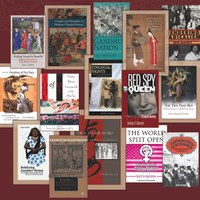CCWgH Celebrates 25 Years of Intellectual Adventures
By Loren Michael Mortimer - On October 26, 2015, the Cross-Cultural Women’s and gender History program (CCWgH) celebrated its twenty-fifth anniversary with a panel discussion made up of faculty, graduate students, and alumni. Leading the panel was Corrie Decker, associate professor of history and ISS Executive Committee member, who currently serves as director of CCWgH. Panelists considered the ways in which the program has enhanced the field of gender history at UC Davis and far beyond by facilitating interdisciplinary and cross-cultural dialogue between scholars from diverse fields.

Susan Mann, professor of history emerita and one of the founders of the CCWgH, described her experiences with the program as “an amazing intellectual adventure.” It began informally, she recalled, with a series of “infamous and delicious potlucks.” By 1992, its members had established Cross-Cultural Women’s History as a minor field of study. In turn, the program's broad interdisciplinary appeal improved the way UC Davis historians approached their scholarship.
Acknowledging the nurturing and productive professional relationships it has forged (and continues to forge), Mann also attributed some of the CCWgH’s early success to “the way it drew together students from across the disciplines, given the interdisciplinary nature of gender studies.” She added that “historians don’t usually read in anthropology and literature, but they do when their students come from those fields.”
Complex and challenging
In the early 2000s, “gender” was added to the program’s title to reflect the fact that “women were not an isolated constituency” and that gender studies had made the field “so much more complex and challenging” than it had been in the 1990s. Decker reflected on the ways in which the CCWgH has transformed how historians approach the field of women’s and gender history since then.
“It is not always easy to measure a change in the tone of gendered discourse,” she said. “But not long before the CCWgH research cluster was established, women’s history was considered a topic that only concerned women.” Cynthia Brantley, for example, was assigned to teach the first U.S. women’s history course because she was one of the first women hired in the department.
Much has changed in the last quarter century. Decker noted that “today, many faculty—male and female—integrate women’s and gender history into their research and teaching in a variety of fields, and male faculty and graduate students are active participants in the CCWgH.”
Center for innovation
From its earliest days, the CCWgH has helped transform UC Davis into a national leader in the study of women’s and gender history. Lisa G. Materson, an associate professor in the Department of History who has served as core faculty for CCWgH since 2002, observed that the program has endured because it continues to serve as a center for innovation in the field of women’s and gender history. Its emphasis on transnational gender studies, as well as its attention to women outside the United States, has in turn sharpened her own scholarship. Studying Kenyan women, she noted, makes her a “better historian” of American women. Materson is currently editing the Oxford Handbook of American Women’s and Gender History along with fellow CCWgH member Ellen Hartigan-O’Connor.
Interdisciplinary strength
While the CCWgH has much to celebrate, Corrie Decker said that she was particularly proud that the Department of History at UC Davis has consistently been a venue for meaningful discussions among historians specializing in East Asian, African, American, Latin American, and European history, producing scholars who care deeply about foregrounding gender in their research and teaching, and attracting top women’s and gender historians in a variety of fields.
Decker also noted that CCWgH members have learned from the work of gender studies specialists in other disciplines, including anthropologists, sociologists, economists and psychologists. In addition to the social sciences, Decker credited collaboration with the Gender, Sexuality, and Women’s Studies Program in the Humanities Division for “strengthening the interdisciplinary work” of the CCWgH.
Notable leaders
The program’s roster of founders and early members features many notable leaders in women’s and gender history, including Cynthia Brantley, Cathy Kudlick, Karen Halttunen, Joan Cadden, Paula Findlen, Beverly Bossler, Ellen Hartigan O’Connor, Barbara Metcalf, and Ruth Rosen. The research interests of these scholars have ranged from the meanings of sex difference in the Middle Ages to the ways women fed their families in colonial Kenya.
Graduate students who participated in the CCWgH have gone on to become teachers and scholars at leading colleges and universities. Lisa Trivedi, for example, was recently promoted to full professor at Hamilton College in Clinton, NY, while Sherri Patton has developed a thriving women’s and gendered history curriculum at Sacramento City College.
The Cross Cultural Women’s and gender History program currently sponsors a minor field for the PhD in History, an annual graduate seminar (201Q), open to graduate students in all fields as well as disciplines other than history, the annual Nathalie Esteban Collin Memorial lecture, and regular research colloquia at which faculty, graduate students and guests present their work.
Learn more about the program at the CCWgH website.